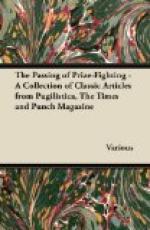Amongst the papers contributed to be read at the evening meetings of the society, perhaps the most interesting was that communicated by Mr. Octavius Spiff, being a startling and probing investigation as to whether Sir Isaac Newton had his hat on when the apple tumbled on his head, what sort of an apple it most probably was, and whether it actually fell from the tree upon him, or, being found too hard and sour to eat, had been pitched over his garden wall by the hand of an irritated little boy. I ought also to make mention of Mr. Plummycram’s “Narrative of an Ascent to the summit of Highgate-hill,” with Mr. Mulltour’s “Handbook for Travellers from the Bank to Lisson-grove,” and “A Summer’s-day on Kennington-common.” Mr. Tinhunt has also announced an attractive work, to be called “Hackney: its Manufactures, Economy, and Political Resources.”
It is the intention of the society, should its funds increase, to take a high place next year in the scientific transactions of the country. Led by the spirit of enterprise now so universally prevalent, arrangements are pending with Mr. Purdy, to fit up two punts for the Shepperton expedition, which will set out in the course of the ensuing summer. The subject for the Prize Essay for the Victoria Penny Coronation Medal this year is, “The possibility of totally obliterating the black stamp on the post-office Queen’s heads, so as to render them serviceable a second time;” and, in imitation of the learned investigations of sister institutions, the Copper Jinks Medal will also be given to the author of the best essay upon “The existing analogy between the mental subdivision of invisible agencies and circulating decompositions.”—(To be continued.)
* * * * *
INAUGURATION OF THE IMAGE OF SHAKSPERE.
AT THE SURREY THEATRE.
“Be still, my mighty soul!
These ribs of mine
Are all too fragile for thy narrow cage.
By heaven! I will unlock my bosom’s
door.
And blow thee forth upon the boundless
tide
Of thought’s creation, where thy
eagle wing
May soar from this dull terrene mass away,
To yonder empyrean vault—like
rocket (sky)—
To mingle with thy cognate essences
Of Love and Immortality, until
Thou burstest with thine own intensity,
And scatterest into millions of bright
stars,
Each one a part of that refulgent
whole
Which once was ME.”
Thus spoke, or thought—for, in a metaphysical point of view, it does not much matter whether the passage above quoted was uttered, or only conceived—by the sublime philosopher and author of the tragedy of “Martinuzzi,” now being nightly played at the English Opera House, with unbounded success, to overflowing audiences[2]. These were the aspirations of his gigantic mind, as he sat, on last Monday morning, like a simple mortal, in a striped-cotton dressing-gown and drab slippers, over a cup of weak coffee. (We love to be minute on great subjects.) The door opened, and a female figure—not the Tragic muse—but Sally, the maid of-all-work, entered, holding in a corner of her dingy apron, between her delicate finger and thumb, a piece of not too snowy paper, folded into an exact parallelogram.




